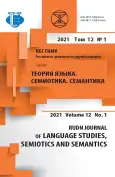Imperative Statements - one of the Forms of Representation of a Linguistic Personality
- Authors: Vasileva A.A.1
-
Affiliations:
- Moscow State Institute of International Relations of the Ministry of Foreign Affairs of Russia
- Issue: Vol 12, No 1 (2021)
- Pages: 185-195
- Section: SEMIOTIC AND POETIC TEXT STUDIES
- URL: https://journal-vniispk.ru/2313-2299/article/view/323402
- DOI: https://doi.org/10.22363/2313-2299-2021-12-1-185-195
- ID: 323402
Cite item
Full Text
Abstract
The article is devoted to the peculiarities of the functioning of imperative statements used in various situations of communication. The purpose of the article is to analyze the main imperative constructions in the context of the speech behavior of the linguistic personality of the main character of a literary text. The method of comparative analysis allows identify the features of the functioning of incentive tactics. This article is an overview of the research available in linguistics on issues related to imperativeness. A broad view of the concept of imperative allows to go beyond the established definitions and expand the field of modality of a literary text. The work examines the main semantic groups that clearly characterize the literary character as a linguistic person. The analysis of imperative incentive statements is viewed through the prism of purposeful communicative activity. A variety of means and ways of expressing imperative statements in the speech of the main character provide an opportunity to differentiate semantic nuances. The scientific novelty of the article lies in the fact that for the first time on the material of the modern Russian novel “The Geographer Drank His Globe Away” by A. Ivanov, the main classes of expression of the semantics of motivation are analyzed. The study identified imperative and non-imperative, but expressing the urge to action, statements, means of lowering the imperative. The lexico-grammatical and syntactic constructions used in the speech of the main character, most common in pedagogical and everyday discourses, are analyzed. The research results are presented as a functional-semantic space.
About the authors
Anna A. Vasileva
Moscow State Institute of International Relations of the Ministry of Foreign Affairs of Russia
Author for correspondence.
Email: a.vasileva@my.mgimo.ru
lecturer
76, Vernadsky avenue, Moscow, Russian Federation, 119454References
- Shvedova, N.Yu. (1980). Russian grammar in two volumes. Moscow: Nauka. (In Russ.).
- Il’ichev, L.F. & Fedosev, P.N. (1983). Philosophical Encyclopedic Dictionary. Moscow: Soviet encyclopedia. (In Russ.).
- Osipov, Yu.S. (2004). Great Russian Encyclopedia. Moscow: Great Russian Encyclopedia. (In Russ.).
- Yartseva, V.N. (1990). Linguistic Encyclopedic Dictionary. Moscow: Soviet Encyclopedia. (In Russ.).
- Fortein, Je. (2008). Polysemy of the imperative in the Russian language. Questions of linguistics, 1, 3—23. (In Russ.).
- Vezhbitskaia, A. (1999). Semantic universals and description of languages. Moscow: Yazyki slavyanskoi kul’turi. (In Russ.).
- Bondarko, A.V. (1990). Functional grammar theory. Temporality. Modality. Leningrad: Nauka. (In Russ.).
- Biriulin, L.A. & Khrakovskii, V.S. (1990). Functional-typological aspects of the analysis of imperative. Leningrad: Leningr. department of the Institute of linguistics. (In Russ.).
- Giiom, G. (1992). Principles of theoretical linguistics. Moscow: Progress. (In Russ.).
- Sarantsatsral, Ts. (1993). Speech acts of motivation, their types and methods of expression in the Russian language [dissertation]. Moscow. (In Russ.).
- Sagalova, E.S. (2009). Functional-semantic field of motivation in Old English [dissertation]. Nizhny Novgorod. (In Russ.).
- Pazukhin, R. (1974). The so-called “imperative mood” and its paradigm. Studia Rossiсa Posnaniensia, 6, 85—95. (In Russ.).
- Vinogradov, V.V. (1938). Modern Russian language. Manual for linguistic faculties of higher educational institutions. Moscow: Uchpedgiz. (In Russ.).
- Klimenko, A.P. (2005). Characteristic features of the lexical structure of the text. Text in linguistic theory and in teaching methods of philological disciplines: proceedings of the III International scientific conference. Mozyr: MGPU, Part I. pp. 13—14. (In Russ.).
- Karaulov, Yu.N. (1987). Russian language and linguistic personality. Мoscow. (In Russ.).
- Karasik, V.I. (1999). Characteristics of pedagogical discourse. Language personality: aspects of linguistics and linguodidactics: collection of scientific papers. Volgograd: Peremena. (In Russ.).
- Karasik, V.I. (2004). Linguistic circle: personality, concepts, discourse. Moscow: Gnosis. (In Russ.).
- Ivanov, A.V. (2014). The geographer drank his globe away. Moscow: AST. (In Russ.).
Supplementary files









